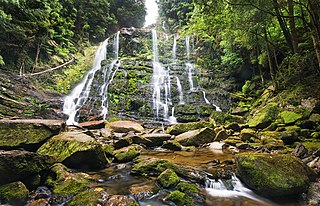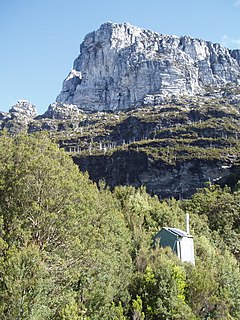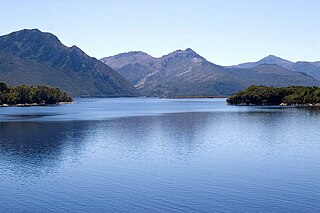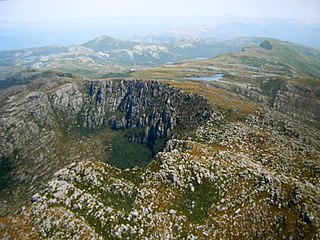Related Research Articles

Franklin-Gordon Wild Rivers is a national park in Tasmania, 117 km west of Hobart. It is named after the two main river systems lying within the bounds of the park - the Franklin River and the Gordon River.

The Franklin River is a major perennial river located in the Central Highlands and western regions of Tasmania, Australia. The river is located in the Franklin-Gordon Wild Rivers National Park at the mid northern area of the Tasmanian Wilderness World Heritage Area. Its source is situated at the western edge of the Central Highlands and it flows west towards the West Coast.

The Lyell Highway is a highway in Tasmania, running from Hobart to Queenstown. It is the one of two transport routes that passes through the West Coast Range, the other being the Anthony Road.

The West Coast Range is a mountain range located in the West Coast region of Tasmania, Australia.

Frenchmans Cap is a mountain in the West Coast region of Tasmania, Australia. The mountain is situated in the Franklin-Gordon Wild Rivers National Park.
Crotty is a former gazetted townsite that was located in Western Tasmania, Australia. The township was located on the eastern lower slopes of Mount Jukes, below the West Coast Range, and on the southern bank of the King River. The locality had had a former name of King River

Mount Owen is a mountain directly east of the town of Queenstown on the West Coast Range in Western Tasmania, Australia.
The Mount Jukes Mine sites were a series of short-lived, small mine workings high on the upper regions of Mount Jukes in the West Coast Range on the West Coast of Tasmania.

Mount Huxley is a mountain located on the West Coast Range in the West Coast region of Tasmania, Australia. With an elevation of 926 metres (3,038 ft) above sea level, the mountain was named by Charles Gould in 1863 in honour of Professor Thomas Henry Huxley.
Mount Darwin is a mountain located in the West Coast region of Tasmania, Australia.
Mount Jukes is a mountain located on the Jukes Range, a spur off the West Coast Range, in the West Coast region of Tasmania, Australia.
Mount Sorell is a mountain located in the West Coast region of Tasmania, Australia.
The mines of the West Coast of Tasmania have a rich historical heritage as well as an important mineralogical value in containing or having had found, specimens of rare and unusual minerals. Also, the various mining fields have important roles in the understanding of the mineralization of the Mount Read Volcanics, and the occurrence of economic minerals.

Mount Roland is a locality, a mountain, and a conservation area in the north west coast region of Tasmania, Australia.
Mount Geikie is a mountain in the West Coast Range of Western Tasmania, Australia.

South West Tasmania is a region in Tasmania that has evoked curiosity as to its resources over the duration of European presence on the island.

Mount Pelion East is a mountain located in the Central Highlands region of Tasmania, Australia. The mountain is situated within the Cradle Mountain-Lake St Clair National Park.

The Tyndall Range, commonly called The Tyndalls, is a mountain range that is part of the West Coast Range located in the Western region of Tasmania, Australia.
The Raglan Range is located in Western Tasmania, it lies east of the West Coast Range.
References
- ↑ Tasmania. Dept. of Lands and Surveys (1951), Frenchmans Cap National Park, The Department, retrieved 11 July 2015
- ↑ "Frenchman's Cap Featured In Map". The Examiner . Launceston, Tas. 15 September 1951. p. 6. Retrieved 11 July 2015– via National Library of Australia.
- ↑ "New National Park Map". The Advocate . Burnie, Tas. 15 September 1951. p. 5. Retrieved 11 July 2015– via National Library of Australia.
- ↑ "Frenchman's Cap Feature of New Map". The Mercury . Hobart, Tas. 15 September 1951. p. 8. Retrieved 11 July 2015– via National Library of Australia.
- ↑ Peterson, JA (1966), Glaciation of Frenchmans Cap-National Park , retrieved 11 July 2015
- ↑ Duncan, DM (1973), Reconnaissance Geology of the Frenchman's Cap National Park , retrieved 11 July 2015
- ↑ Kleinig, Simon (2012), Frenchmans Cap : story of a mountain, Carindale, Queensland Glass House Books, ISBN 978-1-922120-05-2